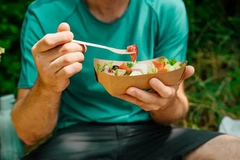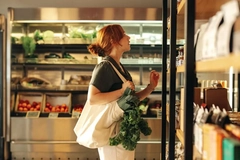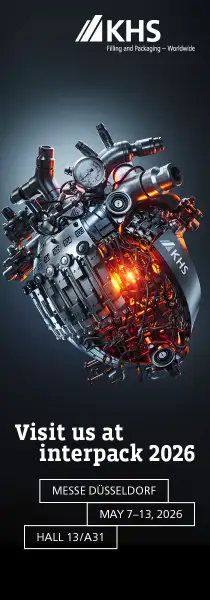Myco CEO: Mushroom-derived packaging is cost-effective, compostable alternative to single-use plastics
Mushroom-based packaging is cost-competitive, compostable, and non-toxic, says David Šohaj Minařík, co-founder and CEO at Myco, a Czechia-based company that develops biocomposite materials from waste feedstocks and fungal mycelium.
Myco aims to eliminate single-use plastic packaging and fillers through research into bio-based alternatives.
The Myco material is a biocomposite made of mycelium, derived from the root-like structure of the Reishi mushroom. The mycelium grows in common waste materials like sawdust, hemp hurds, or paper. It is biodegradable and decomposes naturally without leaving microplastics or harmful chemicals in the environment.
Packaging Insights speaks to Minařík about the potential of fungal-based material for the packaging industry, exploring its limitations, benefits, and misconceptions.
What is Myco’s innovation in fungal-based packaging?
Minařík: We have developed Myco 4Pack and Myco SafePads, a packaging system that combines paper capsules filled with Myco material and cardboard.
These pads cushion products in transit by absorbing shocks and impacts through plastic deformation. The system features high mechanical resilience, low weight, stackability, and minimal storage requirements. It is universally applicable and can be produced in small to medium batches without significant implementation costs.
What are some misconceptions about fungal-based packaging?
 Myco SafePads combine paper capsules filled with Myco material and cardboard (Image credit: Myco).Minařík: One of the main misconceptions is that mushroom‑based packaging production is expensive and complicated, suitable only for small‑batch manufacturing. However, our Myco 4Pack is cost‑competitive with traditional, non‑sustainable solutions. It also comes with zero implementation costs and offers rapid, low‑cost prototyping.
Myco SafePads combine paper capsules filled with Myco material and cardboard (Image credit: Myco).Minařík: One of the main misconceptions is that mushroom‑based packaging production is expensive and complicated, suitable only for small‑batch manufacturing. However, our Myco 4Pack is cost‑competitive with traditional, non‑sustainable solutions. It also comes with zero implementation costs and offers rapid, low‑cost prototyping.
Another misconception concerns stability and storage. Mycelium‑based materials degrade much more slowly in dry environments than in humid, biologically active ones. In low‑humidity conditions (~10–20%), they can last for years. And in extremely dry settings, for example, in a warehouse, they can retain their shape and properties for decades — much like dried wood or paper. The key, therefore, is to protect the material from excessive moisture.
A third misconception relates to the material’s composition. Myco material contains no synthetic plastic foams or films. It is made entirely from natural components (paper and a mycelial composite derived from agricultural and forestry waste). No harmful chemicals are used during production. Substrate sterilization and finished‑product sterilization are achieved solely through heat. The material is non‑toxic and releases no microplastics.
What are the challenges when developing fungal-based packaging?
Minařík: Challenges concern material properties, manufacturing processes, regulatory compliance, and market competition.
Scaling up from laboratory experiments and small‑batch, hand‑crafted production to industrial, high‑volume output is demanding. The most significant challenge was launching a continuous substrate production line and a semi‑automated molding system. Myco has developed its proprietary manufacturing technologies, including a constant substrate preparation process and rapid product forming (reducing time from days to seconds), representing a competitive advantage.
Gaining a foothold in the packaging industry is difficult, as decision‑making processes are lengthy, and competing with long‑standing, highly optimized solutions such as plastics is complex. Plastic fillers are currently very inexpensive due to optimized petrochemical production.
What are the benefits of using Myco packaging?
The Myco material is a biocomposite made of mycelium, derived from the Reishi mushroom.Minařík: The Myco 4Pack packaging solution offers a host of benefits. Its combination of mycelium‑filled paper capsules (Myco SafePads) and cardboard delivers mechanical resilience and shock absorption—benchmarks have shown it outperforming traditional plastic foam in protecting products—while its adaptability allows for custom‑fit designs across diverse shapes and sizes without prohibitive upfront costs.
Economically, Myco 4Pack stands toe‑to‑toe with conventional, unsustainable alternatives, leveraging low‑cost waste inputs and energy‑efficient production to drive per‑unit costs below those of polystyrene at scale, all while insulating manufacturers from rising plastic levies thanks to its eco‑friendly profile.
Implementation is seamless, with zero integration expenses and a rapid, low‑cost prototyping workflow that accelerates time to market. Myco packaging is biodegradable — after use, it naturally decomposes via microorganisms into harmless biomass or compost or can even be safely incinerated — offering a far greener life cycle than paper.
What do you expect fungal-based packaging to be like in the future?
Minařík: Mushroom‑based packaging is poised to become an integral part of the circular economy, supplanting single‑use plastics with ecological, functional, and economic advantages.
Myco is preparing to globalize its technology by licensing its highly efficient, on‑site production processes to partners abroad, enabling companies to manufacture custom packaging directly from local waste streams, thereby slashing the carbon footprint associated with material transport.
 Scaling from lab experiments is challenging, says Minařík.At the heart of this scalability lies Myco’s proprietary manufacturing platform, combining continuous substrate preparation with rapid, seconds‑scale product forming to deliver high throughput and consistent quality. Looking ahead, Myco plans to accelerate design workflows by launching MycoCreator, an AI‑driven software suite that will autonomously generate optimized packaging geometries.
Scaling from lab experiments is challenging, says Minařík.At the heart of this scalability lies Myco’s proprietary manufacturing platform, combining continuous substrate preparation with rapid, seconds‑scale product forming to deliver high throughput and consistent quality. Looking ahead, Myco plans to accelerate design workflows by launching MycoCreator, an AI‑driven software suite that will autonomously generate optimized packaging geometries.
This innovation will dramatically shorten the path from concept to prototype, minimizing lead times and manual design effort. Future integrations with automated molding and assembly equipment promise to further boost efficiency, driving toward a fully automated, end‑to‑end production ecosystem that brings sustainable, high‑performance mycelium packaging within reach of industries worldwide.












